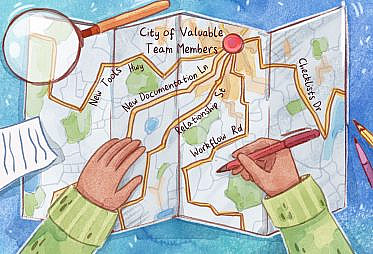Imagine you hit a roadblock while trying to tackle a complex piece of analysis, using a python function or designing your first data organization. What do you do? Of course you start with an internet search, but what do you do when you’re really stuck? I like to phone a friend.
In this post I explore my favorite learning style – learning from others – and the steps to building your own analytics brain trust. I have used this approach to solve many challenges (including building an Analytics team from the ground up) and I believe it can be almost universally applied.
Origin story
In a past life I worked as a management consultant, often undertaking strategy projects in obscure industries. Due to the niche nature of these industries, internet resources were typically unhelpful or unavailable. As a result, we often spoke to experts in the field – scientists, business leaders, researchers and end-users.
What impressed me the most by the industry experts was their ability to distill the most important aspects of an idea and convey them in a way anyone could understand. Of course it was hit or miss (some experts were just plain bad) and you had to do enough preparatory research to ask good questions (and to keep the calls short and focused since you were often paying by the hour). However, when you did get a great expert on the phone an hour with them could save a week of research.
Building your analytics brain trust
Fast forward to starting my first Analytics team at a small startup. It would be an understatement to say I had no idea what I was doing. However, I had one thing going for me, I knew how to build up knowledge fast – by phoning a friend. I just had one problem – I didn’t have any friends in analytics. So how do you build your analytics brain trust?
As a quick side note – this is how I met Ilan, Michael and Sam and many of my other NYC data friends.
Step 1: Assume people will be receptive
Everyone started where you are (i.e., with no network and no knowledge) and many of them are open to having conversations either out of genuine friendliness or a desire to “pay it forward.” When you first start it may be scary to reach out to people with whom you have a tenuous connection at best, but remember people are generally nice. You will be surprised who will respond (for example, a twelve year old Steve Jobs successfully reached out to Bill Hewlett, the CEO of HP). After all, what is the worst that can happen – they say no or don’t respond at all?
Step 2: Set a goal and do your research
Make sure you have a defined knowledge goal before you begin reaching out to people and be as specific as possible. There is nothing worse than giving your time to talk to someone when they don’t know what they want.
In my case my goal was:
I am building an Analytics team, so I am looking to speak with others who have done it before. Specifically I would like to learn about specialist vs generalist models, titles and how the Analytics team interfaces with the rest of the organization.
I also recommend conducting specific research on the people you contact to understand what relevant experience or knowledge they may have. This will allow you to craft your message and, in the event of a conversation, your questions.
Step 3: Reach out to your warmest contacts (and be accommodating)
Message your warmest contacts who may have relevant knowledge or may know others who have relevant knowledge. Warm contacts are those you already have an existing relationship with and would be happy to chat with you. The better your existing relationship, the warmer the contact is (e.g., family members are the warmest contacts, complete strangers are the coldest contacts).
If you don’t have any warm contacts, contact people who you have something in common with (e.g., university, home town, industry). Linkedin is a great place to meet new contacts, but industry-specific or topic-specific conferences, meetups, messaging boards and Slack communities are even better.
Craft your message so that it is specific, friendly and most importantly accommodating. Make meeting you sound like a very light lift. Here is a message I sent many years ago:
Hi XXX, I am building out an Analytics team and would love to chat with you to learn about how you’ve gone about building your team at YYY company. I can imagine you have similar challenges (e.g., interfacing with stakeholders and deciding on the generalist vs specialist model). Happy to work around your schedule and come to you. Let me know when works best.
Alternatively, if the contact is not local you may want to offer a phone call. Just be aware that it is much easier to build a rapport with someone in person.
Step 4: Ask good questions and make a genuine connection
People can quickly tell if you are being disingenuous and only want a job or an introduction. It is incredibly important not to mislead people – they are donating time to you, and you should be genuine in your goals. If you are looking for a job or a favor, that is a very different conversation than what I am describing here, and you will want to take a different approach
I advise going into the conversation with the goal of learning and potentially forming a professional or personal relationship – a job or an introduction is icing on the cake. I met many of my closest friends in the NYC data scene through conversations just like this.
During the conversation, make sure you have a list of topics you want to cover, but allow the conversation to flow naturally. You don’t want your coffee chat to feel like an interrogation. Also, if you force the conversation down a specific path you may miss a relevant topic that your coffee mate is especially knowledgeable or passionate about.
I typically brainstorm questions in advance and write them down, but during the conversation I mostly keep my notebook closed. If there is a lull I might say something like “I think there was one more thing I wanted to ask…” and then flip open my notebook. You need to find a balance between “stenographer” and just-passing-the-time. While you might not be taking detailed notes during the conversation, it is very important to write down notes immediately afterward while the conversation is still fresh in your mind.
Quick note: Learning from someone you meet for coffee is a bit like asking a stranger on the street for directions – they may very confidently give you very bad advice. Always be a sceptic and collect multiple data points before making an irreversible decision. You will never get statistically significant life or career advice, but always do your due diligence.
Step 5: Ask for recommended contacts (and repeat)
While your first wave of conversations may not be perfectly relevant to the topics you are looking to learn about, your coffee mates may know other, more relevant people to chat with. After a genuine, friendly conversation it is perfectly acceptable to ask your coffee mate if she has anyone she would recommend speaking to. You may even find that during a great conversation your coffee mate starts mentioning people to talk to without you even having to ask.
You will not hit it off with everyone you meet and that is fine – just make sure you are polite and respectful. However, if you continue to work at it you will continue to develop your own analytics expert network and hopefully meet a few friends.
So when do you stop? Never.
I’m in the field of Analytics, because I love it and like any topic I love, I am happy to talk (and write) about it for hours. Whether it is a conversation over lunch or a panel at a conference, I continue to learn from the diverse opinions of my friends and colleagues. While we may not always agree (you should hear Michael and me discuss reporting), I always learn.
Your analytics brain trust is especially helpful to stay on top of the latest developments in an evolving field like Analytics. It is impossible to stay on top of every new technology and trend so it pays to have a diverse group of friends with a wide range of interests.
Giving back and paying forward
The system only works if you give back. People quickly notice if you are always asking questions but never answering them, asking for introductions but never offering them or asking people to chat but never accepting invitations. Try to keep track of your “karmic balance” and make sure you are contributing as much as you are benefiting. Certainly there are times when you are underwater and can’t contribute; in those cases just be honest with people when they reach out.
One challenge, of course, is how to give back if you don’t know anything. An easy way to start is to share interesting articles and blog posts you find (it is very difficult to stay on top of everything that is written in the space, so I love when people send me interesting articles). Once you begin to gain more experience you will probably find a couple topics you are passionate about and could talk about for hours (e.g., agile analytics, the prioritization meeting, data warehouse SLAs, communication and web analytics). At its best, building your analytics brain trust looks a lot like two friends or colleagues discussing topics they are passionate about, because that is exactly what it is.






